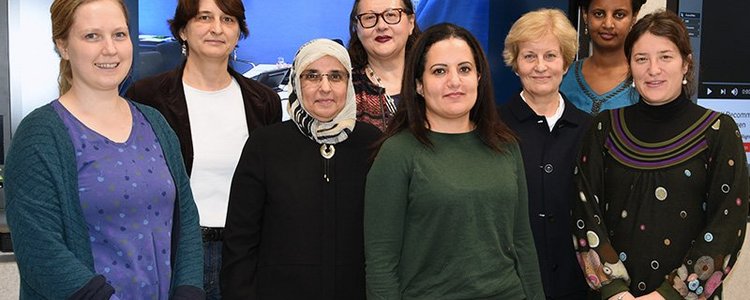After three years of intense collaboration, IUG has a dedicated organizational unit, the Women’s Studies Center (WSC), that is firmly a part of the university structure and provides a place for scholarly discussion and research and is the first of its kind in a higher education institution in Gaza, it has faculty educated in gender studies, a reference library of books in both English and Arabic and, most importantly, a community of women and men from within and outside of the university interested in gender issues.
The successful cooperation began in 2017 when Professor Sanaa Abou-Dagga, together with the head of the International Relations Office, Amani Al Mqadma, approached Prof. Libora Oates-Indruchova at Uni Graz with a proposal to develop the project Strengthening Higher Education Capacities in Palestine for Gender Equality | SHE-GE under the Austrian Partnership Programme in Higher Education and Research for Development (APPEAR). The Austrian team gained the reinforcement of Dr. Brigitte Holzner, an experienced specialist in gender and development. Her expertise complemented that of Libora Oates-Indruchova who was active in the institutionalization of gender studies in the Czech Republic in the 1990s and early 2000s.
Over the three years, both partners could meet almost exclusively online due to the security situation in Gaza, thus unwittingly practising what became the reality for most of the academic world during the current COVID-19 pandemic. The project taught five online MA courses attended by students of both universities, supported eight MA dissertations, organized lecture series for scholarly audiences and also training seminars for higher education faculty and staff, NGOs, state administration staff in Gaza, translated a basic undergraduate gender studies textbook into Arabic, so that the specialist discourse could continue in the local language in Gaza, and began to develop a full two-year MA degree programme in Women’s Studies. Prof. Sanaa Abou-Dagga also visited Graz once and had the opportunity to meet with various university administrators working in the area of gender equality.
The eight MA dissertations, the so-called “Mirror MAs”, that the project supported, contained an innovative teaching method of “mirroring” a research topic at both universities. A pair of students, one from each university, worked on the same umbrella topic, although from different disciplinary perspectives, and shared their experience of the research via online communication. In that way, they caught glimpses of each other’s common and specific problems and had a chance to discuss these and help each other to overcome them.
Not only the whole project, but also its content was strictly demand and needs driven: the Graz team made suggestions, but the articulations of what needs to be developed and how came from Gaza. In that, as well as in the day-to-day communication, the programme was implemented in the spirit of true partnership, on which both teams hope to build in planning a new stage of developing gender studies in Gaza.
